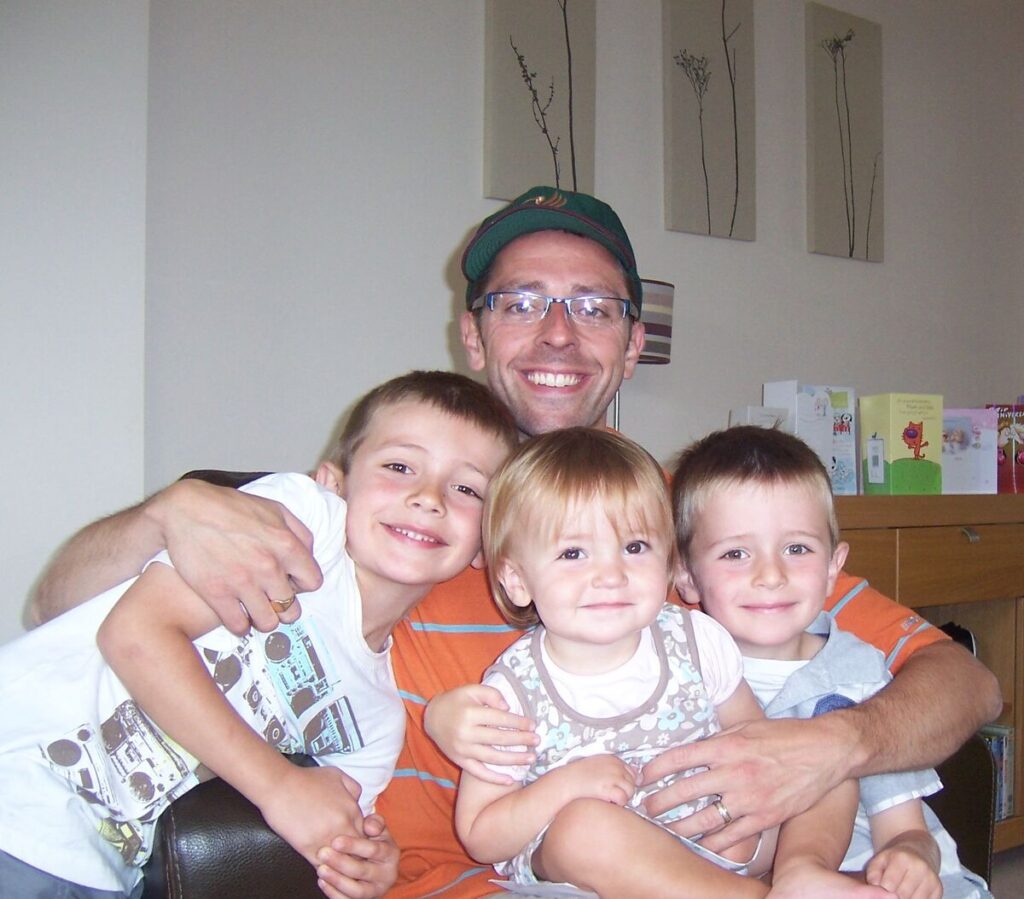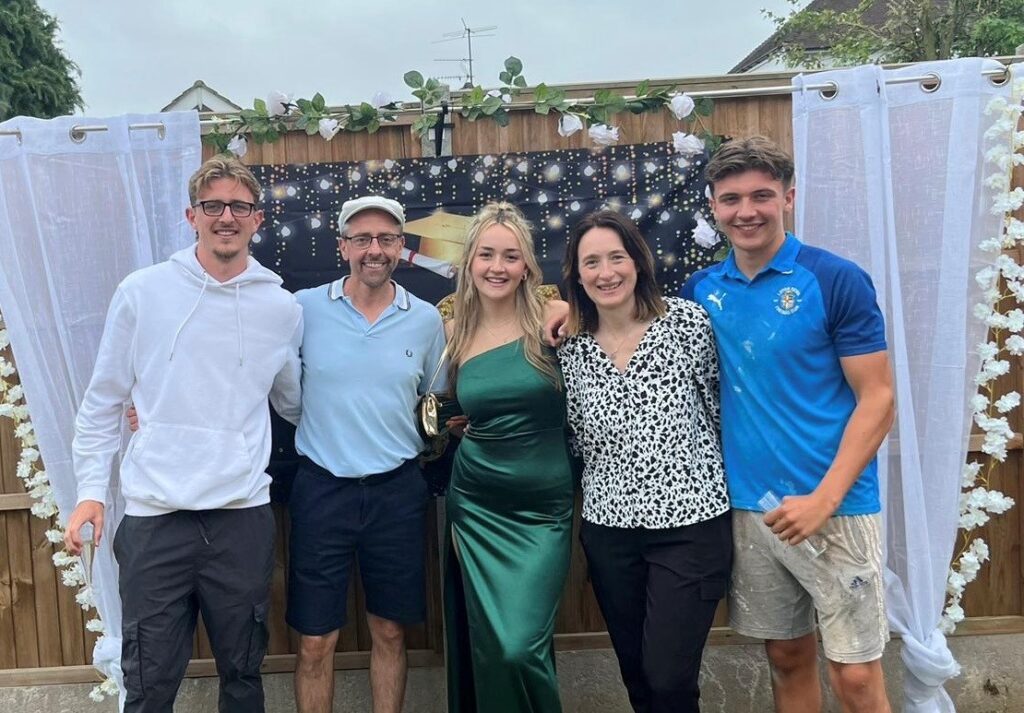David, a father-of-three from Bedfordshire, has, in his own words gone through a ‘rollercoaster journey’ from when he was first diagnosed with melanoma back in 2019, to being told he had Stage 4 cancer which had spread to major organs of his body, to five years after his first diagnosis when he was told there was no trace of cancer left in his body.
But despite how hard it has been, not just for David but for his family too, he still says he feels blessed to have gone through it.
“It is good to have gone through this – to live to tell the tale.”
David was first diagnosed with melanoma in 2019. He’d gone to the doctors with a small growth on his head which was bleeding a little – but with no pain or any other symptoms, David didn’t think anything of it.
“My GP told me to return a week later if it was still there, so I did and he took a biopsy. I was in a meeting at work and got a call telling me they wanted to see me and I said, ‘ok when can we arrange for me to come and see you’ and they said, ‘no, we need to see you now.”
That was when David was told he had melanoma. He was admitted to Addenbrooke’s where he had his lesion removed and a skin graft to cover the area on his scalp, performed by Dr Durrani, a Consultant Plastic and Reconstructive Surgeon at the hospital. The nearest lymph node was tested and David was told that his lymph nodes did not contain any trace of cancer, so the family celebrated.
A year later, a lymph node in his neck swelled up ‘like a frozen pea’ and that was when David was told his cancer had returned. He then had an operation to remove lymph nodes from his neck, followed by radiotherapy. Again, David was told that there was no sign of cancer anywhere else in his body.
It was at this point, David was introduced to Dr Pippa Corrie, a Consultant Medical Oncologist specialising in treating patients with melanoma and pancreaticobiliary cancers at Addenbrooke’s, who put him on a course of preventative immunotherapy. David returned to Addenbrooke’s every three months for an MRI on his head and a full body CT scan.
David said he took life three months at a time, until on his birthday in 2021, he was told the cancer had returned – but was now Stage 4, and had spread to his liver, lungs and spine.
“I just thought, it’s Stage 4 and has spread to all those organs. I’m done.”
He said he felt ‘punch-drunk’ when he was told the news and went off to play a round of golf, leaving his wife, Lisa, ‘at home in bits.’
“All I could think about was my family. Having kids is the best feeling in the world. I just didn’t want to think about not being there to see them growing up, doing things like walking Grace down the aisle.”

“When they’re born, the feeling you get… is unbelievable.”
But in his characteristically humorous approach, David said, “The only thing that comes close to that feeling was finishing the London Marathon” – to which he got a lot of raised eyebrows and laughter from his family; wife Lisa, and children, George, 22; Jack, 19, and Grace, 17.
But despite the grim prognosis, David characteristically fought his cancer head on, trying to ‘normalise’ it as much as possible.
“I knew I had to normalise it as quickly as possible in the house because my kids were young. I normalised it by making fun out of it. I play fight with George and Jack but I’d play up and say things to them like ‘you can’t fight me, I have cancer.’ But I like to think that cancer hasn’t completely ruined their young lives and that’s credit to how me and Lisa have set the tone and dealt with it.”
David refers to himself a lot as ‘lucky’ – explaining that about 40-50% of patients aren’t able to tolerate the immunotherapy drugs he was given after his Stage 4 diagnosis. And he added that not every cancer responds to it – but melanoma does.
It was at this point Pippa put David on a pioneering form of immunotherapy – combining two drugs – “which she said was like kickstarting your immune system. Like starting the engine of a car.”
Believing he was dying, David set about getting all his life in order, looking at his life insurance and pension. He then went about creating as many special memories as possible, organising trips with family and friends. He took his wife Lisa back to where he proposed; went away with sons George and Jack; and took ‘the girls’ away too, Lisa and his daughter Grace. He also went on a trip to Benidorm with his mates.
He says having cancer makes you crave ‘normal’ – “You are in the moment more when you have cancer, you are listening to everything the kids are saying, just trying to take every single thing in. I didn’t want to go anywhere, I just wanted to be with them.”

David says when Pippa told him and Lisa in January that there were no longer any traces of cancer in his body, and that there was only a 2% chance that it would return, he said neither of them reacted in the way that people would have expected.
“I was a bit numb and Lisa apologised for being really quiet. Lisa asked Pippa again, ‘so there’s not any more cancer?’ and Pippa said no. But then Pippa had to start telling us, ‘there’s only a 2% chance of it returning, which means there’s a 98% chance it won’t.”
David has nothing but praise for all the surgeons and medical staff who helped him on his cancer journey. He said even after a long shift, Dr Durrani, would return to the ward to check on him. As for Pippa, he says the experience has built a special bond between them.
“I am not religious but if there is a God in the world she has to be up there doesn’t she? The hours she puts in, the research she does, she’s the trustee of Melanoma Focus. As a patient you put the consultants up on a pedestal, but they deserve to be. They’re amazing.”
For Pippa, that bond is reciprocal. “Being an oncologist is a challenging role. We get to know patients who are sometimes quite vulnerable and need to trust us, and that closeness of the relationships is actually very rewarding, whether or not we are breaking bad news or giving them good news. We can walk alongside them on their journey and hopefully be friends to them in the longer term.”

He has also, he says, built up a special relationship with everyone here at ACT – and remembers popping in to tell everyone the good news in January just after he left the hospital.
“I came and told everyone and there were a few people in tears.”
Having raised an impressive £50,000 for the Cambridge Cancer Hospital, David wants to keep on going and and is now part of the Patient Advisory Committee, giving his input into the new hospital.
“Now, my attitude is ‘life is for living.’ If health is the most important thing in the world, then being told you no longer have any trace of cancer in your body is like winning the lottery.”
Return to stories

